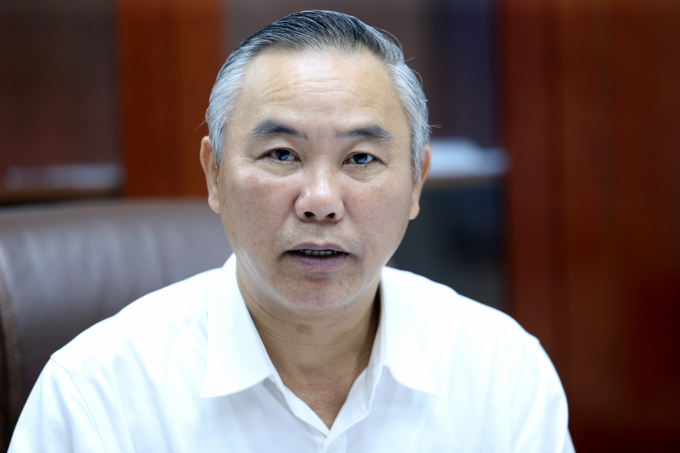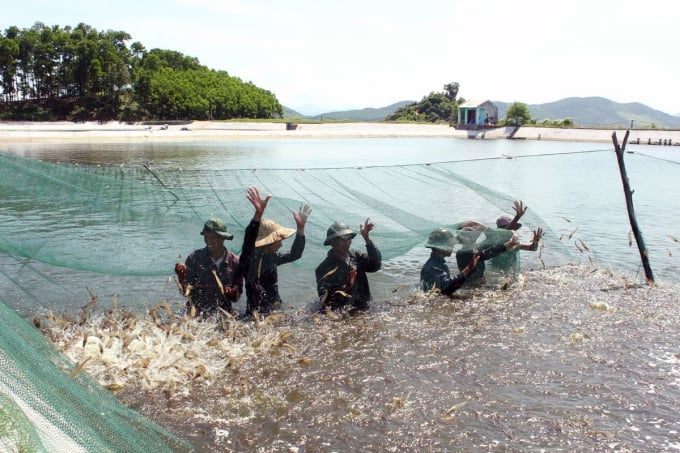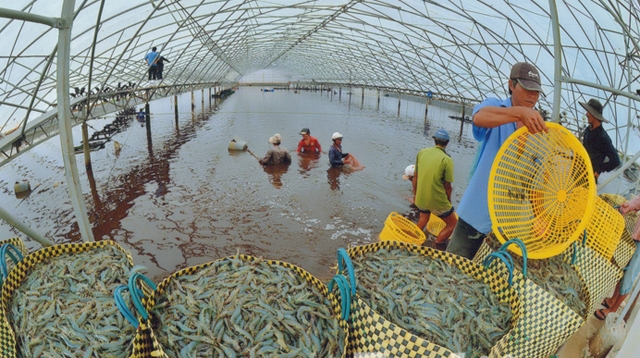May 31, 2025 | 13:04 GMT +7
May 31, 2025 | 13:04 GMT +7
Hotline: 0913.378.918
May 31, 2025 | 13:04 GMT +7
Hotline: 0913.378.918

: Deputy Minister of Agriculture and Rural Development Phung Duc Tien. Photo: Minh Phuc.
Only 40 per cent of shrimp farming areas are currently invested with a three-phase power supply system in the Mekong Delta provinces.
The irrigation infrastructure for water supply and drainage has worked ineffectively in the provinces.
It was said by Deputy Minister of Agriculture and Rural Development Phung Duc Tien at an online conference held recently to discuss on solutions for the shrimp sector’s sustainable development as well as deploy the Viet Nam Fisheries Development Strategy by 2030, vision towards 2045.
Tien said the country’s shrimp farming area now reached only 740,000 ha.
So, it was difficult to raise the shrimp farming area in order to increase the commercial shrimp quantity, he added.
Even the shrimp farming area this year had tended to decrease slightly compared to the same period last year, he said.
Tien also said to reach the growth target, the shrimp sector needed to improve the product quality; reduce the cost of shrimp seeds and feed; control the farming environment and promote processing shrimp by high-tech applications.
It was imperative to invest more resources to improve the technical infrastructure of shrimp farming areas, especially in the Mekong Delta localities, he said.

The current infrastructure for shrimp farming is still poor and has not met the practical requirements. Photo: LHV.
Tien said the agricultural ministry would mobilise investment capital from the State budget for medium-term public investment in the period of 2021-2025 to develop the shrimp farming infrastructure in the delta.
It would also mobilise loans from the World Bank and other capital sources for developing the infrastructure of key shrimp seed production areas and high-tech farming areas in the coastal provinces of the delta, he said.
Besides, after the COVID-19 pandemic is under control, the ministry will organise a conference in the southern region, inviting the Viet Nam Electricity and the State Bank of Viet Nam to discuss on mobilising capital and technical infrastructure for aquaculture in the delta, he said.
Tien also added that there must be a solution to deal with environment in the shrimp farming area.
Currently, it discharged several grammes of sludge into the environment to produce one kilo of shrimp, he said.
So, it was very hard to control the environment as well as the source of the disease, he said.
Therefore, Tien told the Directorate of Fisheries to develop an environmental treatment project for shrimp farming areas associated with infrastructure development to thoroughly handle the problem in order to avoid allowing waste from a shrimp pond to flow into another the pond.
Tien also assigned the Department of Animal Health to strengthen disease control and take appropriate solutions to minimise damage to shrimp breeders by strengthening the construction and development of disease-free farming areas.
“The model has been done very carefully in Bac Lieu Province and Viet-Uc Group,” he said.

It must pay more attention to prevent diseases for aquatic animals like terrestrial animals, he said.
There are only 10 per cent of the shrimp ponds granted a code in the delta now.
It did not meet the requirements, he said.
In the meantime, provinces of Bac Lieu, Ben Tre and Ca Mau had proposed the ministry to fix shortcomings in granting the code for shrimp ponds, farming areas as well as the registration certificates of shrimp farming establishments in accordance with the 2017 Law on Fisheries and the Government’s Decree No 26, he said.
Thus, the agriculture ministry would work with the Ministry of Natural Resources and Environment to submit the Government to amend the decree No 26 in order to create a more open legal corridor for localities to issue codes for shrimp ponds and farming areas in the future, he said.
The move was very necessary because the market required products to be traceable to the origin while the code of the growing area and the code of the farming area were important factors for traceability, he said.
Tien asked the Agro-Forestry-Fisheries Quality Management Department to effectively control the food safety of raw shrimp as well as impurities and chemical residues in shrimp products to improve the quality and brand of Vietnamese shrimp in the future.
Besides, for export, the department needed to guide businesses and shrimp breeders to raise and process shrimps according to the standards and regulations of each specific market, he said.
The Department of Agricultural Product Processing and Market Development were ordered to actively assess the market’s developments to propose solutions and timely help localities and producers make appropriate production plans, he added.
Deputy Minister Phung Duc Tien said from the practical results of building a value chain of tra-fish products (currently, 80 per cent of producers participate in the chain with the guidance of enterprises), it could be affirmed that the products’ value of the chains was always higher than those outside the chain.
Therefore, promoting linkages in production, consumption, processing and commercialisation in the value chain of the shrimp industry was very important now, he said.
Translated by Thu Hang

(VAN) Seafood by-products are opening a new path, combining green growth and technological innovation to enhance the industry's value.

(VAN) Mr. Nguyen Thanh Cong, Vice Chairman of the Son La Provincial People's Committee, reflects on Son La’s journey from barren hills to fruitful orchards after a decade of hard work.

(VAN) FAO’s Director-General addresses the 5th Baghdad International Water Conference.
/2025/05/26/1716-4-nongnghiep-191706.jpg)
(VAN) Chain linkages, technological innovation, and raw material zoning are three strategic pillars for the coconut industry to strongly develop and elevate its position on the global agricultural map.
![Advanced mariculture – an inevitable trend: [4] Accompanied by scientists](https://t.ex-cdn.com/nongnghiepmoitruong.vn/608w/files/sohk/2025/05/13/1941-pgsts-vo-van-nha-140958_717.jpg)
(VAN) According to Assoc. Prof. Dr. Vo Van Nha, Director of the RIA III, the development of advanced offshore mariculture is no longer an option but an essential path for Vietnam’s fisheries sector.

(VAN) Vietnam is intensifying the development of mollusk farming areas that meet international standards, aiming for sustainable growth and enhancing its export position in the global seafood market.
![Advanced mariculture – an inevitable trend: [3] Policy-driven momentum](https://t.ex-cdn.com/nongnghiepmoitruong.vn/608w/files/doanhtq/2025/05/21/0104-0616-0348-nuoi-bien-170339_789.jpg)
(VAN) To ensure the success of offshore mariculture that uses advanced technologies, it is essential to establish supportive policies that inspire both individuals and enterprises to invest with confidence.